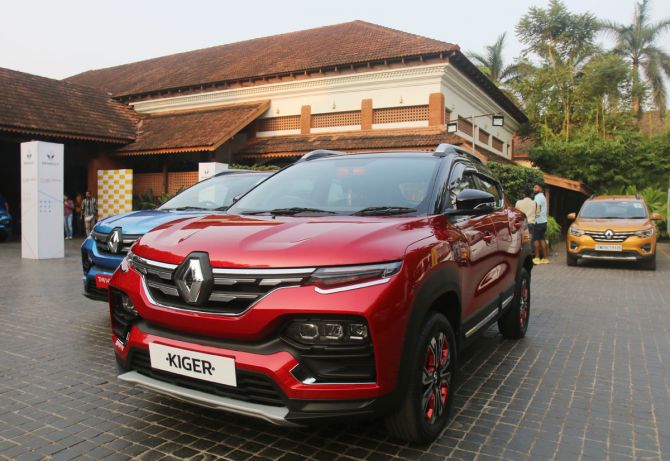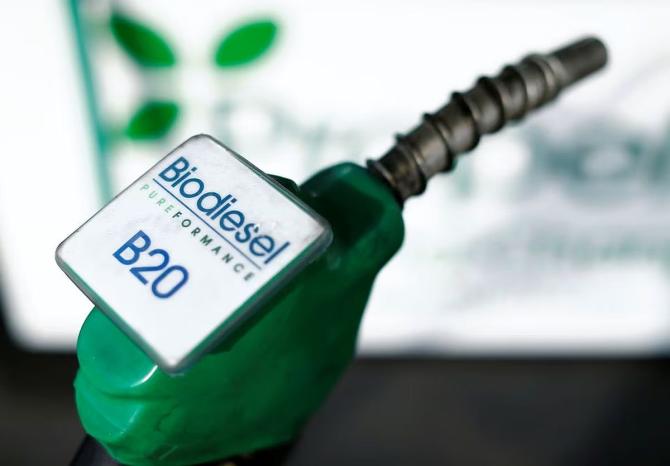'No plans to phase out Kwid until rules allow.'

Renault India, which saw a 33 per cent decline in sales in 2023, is facing a challenging 2024.
The company's Managing Director and Chief Executive Officer Venkatram Mamillapalle, discusses the company's revival plans, launch strategy, and the future of the Kwid in a face-to-face interaction with Shine Jacob.
Renault India sold only 52,620 units in the 2023 calendar year, down 33 per cent compared to 2022. What is your revival strategy?
In 2011, we launched the Duster and then the Kwid. These are the two very successful models we introduced in India.
We launched many other products, but they only did what was possible at that time.
In 2019, we launched the Triber, which was very successful, and we were doing very well with no competition.
In 2021, we nearly reached 100,000 vehicles, but then the pandemic downturn happened.
Post-pandemic, we saw a drop in volumes again. Unfortunately, the pandemic hit just 30 days after we launched the Kiger.
We had to relaunch it after the second wave of the pandemic, by which time competitors had also launched similar products.
We then faced issues related to cash flow due to the Ukraine war and our exposure to Russia. Our market share dropped from 3 per cent to 1 per cent.
We knew we were heading into this situation and alerted our dealer network that 2023 and 2024 would be challenging years.
At the beginning of 2023, Renault-Nissan announced our investment (Rs 5,300 crore) for six launches.
We have already invested 70 per cent of that amount and are working in that direction.
In the meantime, we are improving our service network, bringing in safety and technical features, and coming up with limited editions.

What's the timeline for these launches?
We will soon announce the timeline for our launches, which should start bringing us a turnaround.
All launches will happen within the next one and a half years. They will be spaced out because dealers and customers will not be able to accommodate such launches all at once.
Currently, we are using only about 45 per cent of our total plant capacity of 480,000. We must fully utilise this before we expand further.
With declining demand, where do you see the future of the A-segment (sub-4 metre cars), in which you are one of the last two players through the Kwid?
As long as regulations allow, we will continue to stay in this segment and are not planning to exit.
Today, I am using a 1-litre engine; if emissions regulations change, I may need to switch engines or discontinue the car.
That is not a decision I will make today because my vehicle will qualify at least until the Bharat Stage-VII standards come into effect. I have five more years to go.
Regarding safety, I can introduce features like six airbags when the regulations require it.
We will upgrade for safety requirements, but I am not going to change the shape of the car.

Since reports indicate that you are also launching your eKwid, what is your take on electric vehicles (EVs)?
We do have an EV coming up, but I don't need to call it the Kwid. It could be named something else.
EVs will grow, and many new companies will enter the market.
These will mainly be in urban areas and will not penetrate rural markets due to the lack of infrastructure there.
The ecosystem is not just about charging but also includes other infrastructure, which takes time to develop. More power production is also needed.
Today, our car market is at 4.3 million units, and by 2032, we expect it to be around 7 million.
At that time, we should have 10-12 per cent EVs, or around 700,000 cars. EVs will grow and get priority after that, and the real takeoff of EVs will occur.
Did the war in Russia affect your investment plans in India?
Yes, that is why we delayed our launches. Renault's global financials were affected by the crisis.
We had four plants in Russia and had handed them over to the government almost for free. It did affect our investment plans in India.

What is your alternative fuel strategy?
We are pioneers in ethanol in Latin America and Brazil, where our vehicles run on 100 per cent ethanol.
I am a strong advocate of ethanol blending because it supports farmers and reduces the crude oil import bill.
Fuel prices could drop a lot if India shifts to E85 (flex fuel). We should be faster in adopting ethanol, which would benefit farmers in Uttar Pradesh, Tamil Nadu, and Karnataka.
Feature Presentation: Rajesh Alva/Rediff.com












 © 2025
© 2025